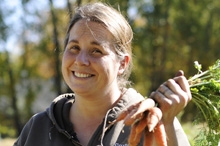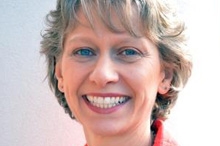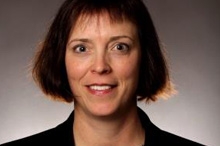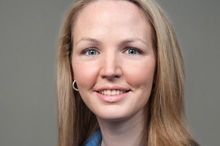Champions of Change Blog
Growing Food for Today and Farmers for Tomorrow
Posted by on April 1, 2014 at 12:46 PM EDT
Sonia Kendrick is being honored as a Women Veteran Leaders Champion of Change.
It is an honor to have been selected as a Champion of Change. As a veteran of the war in Afghanistan, I experienced what war and food insecurity can do to a people. I came out with an understanding that whoever controls your food controls you and that our ability to feed ourselves is the root of our democratic right to rule ourselves. I also realized that food security is national security and that plows are greater than swords.
Returning to civilian life I shoved my military experience into a box under my bed. Two children and four years later the economy collapsed and I was laid off from my factory position. Unable to find a job, I decided to return to school and pursue my dreams of farming.
At this time, I believed that I could not become a farmer because I was not born into a farm family. I believed—as many Americans—believe that farming is a caste system and is accessible only to those who carried the birthright of land. I thought becoming an agronomist (Farming Scientist) was as close to farming as I could get.
While attending Iowa State University, I was told that the mantra was "Iowa Feeds the World", yet Iowa has almost 400,000 food insecure people (Feeding America). I found a great disconnect from the mantra and reality, given that Iowa was not even feeding itself.
In response, I decided to start a small, half-acre vegetable farm in order to get fresh vegetables into local food pantries. About this time the military box under my bed turned into a monster and came out in the form of PTSD. I did not understand what was happening to me and I was barely holding onto my sanity. I found that the work on the farm grounded me in that it gave me a mission and a purpose. Through God’s grace I can serve my people again in a positive way.
Like many American states, Iowa imports over 90% of its food (Leopold Center). This directly ties the cost of our food to the price of fuel. As fuel prices increase, so will the cost of our food. Without a systems change, we will have more hungry in the future.
We have a global food system that runs on fossil fuels; a volatile system, considering the population is projecte to increase to 9 billion by 2050. The threat of limited fossil fuels and climate change make it necessary to come out of the global food line and create our own food. Doing so would keep $230 million in Iowa every year (Leopold Center). The USDA says we also need 10,000 new farmers a year in order to meet growing food demands.
Food insecurity and the need to change our food system from a transportation-based food system to a locally-based food system are problems that can solve each other. I founded Feed Iowa First to confront food insecurity today by growing food and tomorrow by teaching farmers.
In my county, there are over 25,000 food insecure people (Feeding America). To feed these 25,000 people their minimum 2.5 cups of vegetables every day for one year, it will take approximately 500 acres. I did a GIS survey of three cities in my county and there are over 800 acres of underutilized land surrounding just churches. So, the land is there to solve the problem of food scarcity, it is only a matter of whether or not we take advantage of it. Currently, we are urban farming in 3 cities in my county and last year produced and donated nearly 22,000 pounds of fresh vegetables.
Sonia Kendrick is a veteran of Operation Enduring Freedom, and the founder and Executive Director of Feed Iowa First, collaborated in the creation of Women Veteran Farmer Coalition in Iowa and the secretary of Linn CO Food Systems Council. She is most importantly a mother who is concerned with the future of her children.
Learn more about VeteransForging Partnerships, Building Friendships and Serving Veterans...the Washington State Way
Posted by on April 1, 2014 at 12:34 PM EDT
Mary Johanna Forbes is being honored as a Women Veteran Leaders Champion of Change.
It’s hard for one person to change the world. But with the power of partnerships, more specifically friendships, I truly believe that anything is possible! So when U.S. DVA Secretary Eric Shinseki pledged to end veteran homelessness by 2015, I knew without a doubt that my agency, the Washington State Department of Veterans Affairs, would need to enlist the trust, the buy-in and the participation of our friends across the state to achieve this goal in Washington.
We boldly seized the opportunity Secretary Shinseki provided by issuing our own “Call to Action” and held a Statewide Homeless Veterans Housing Summit in June 2010. This was our catalyst to develop and implement our vision to honor Washington’s veterans. We actively engaged and secured commitments from key community partners, promoted best practice models to effectively serve more veterans, and facilitated the coordination of grant requests at the local level. In four years, we’ve been able to show a reduction from 2,800 un-sheltered homeless veterans to less than 1,500. Most importantly, we did this by connecting not-for-profit organizations to grant opportunities so that they could fund their individual operations and help veterans break the cycle of chronic homelessness.
We also focused on incarcerated veterans and helped counties develop veterans courts and other programs connecting veterans with their benefits. Often these wrap-around services help veterans stay on a path to success and self-sufficiency by focusing on treatment, housing and, ultimately, employment. Our current recidivism (repeated incarceration) rate is less than 20% while non-veteran recidivism is over 50%.
We’ve partnered with the Washington State Department of Corrections to develop veterans’ dorms in our state correctional facilities that not only restore pride and dignity to veterans with untreated war trauma issues, but also begin the “upstream” process of connecting them to their VA benefits and other community programs long before they leave prison or while they are in work release. This is an ongoing project with a goal of helping veterans succeed in life after incarceration.
Knowing that the end of the wars meant more military personnel would be separating and joining our civilian workforce, we started a three year project at Joint Base Lewis McChord. This project led to the Veterans Opportunity for Work to Hire Heroes Act proposed by Senator Patty Murray and signed by President Obama in November 2011. The VOW Act is improving services for transitioning service members by focusing on education, employment, entrepreneurship, and apprenticeships. Our model is now used by Transition Assistance Programs worldwide.
At the state level, Washington State Governor Jay Inslee signed his first Executive Order in January 2013 creating the Washington State Military Transition Council, a collaboration between the military, corporations, state governments and non-profits to break barriers to effective transition and employment for veterans.
I also have the privilege of leading the Washington State Women Veterans Summit where women veterans have opportunities to apply for their benefits, get self-help and assist our agency in spreading the word on the many benefits available to those who have not applied. We are proud that women veterans’ access to care in Washington VA facilities has increased nearly 25% in the past three years!
I have had the opportunity to serve my country, to raise five children, and then the good fortune to become a part of the Washington State Department of Veterans Affairs where I have the ability to enhance the quality of life for veterans and their families. It is my distinct honor to have been selected as a Champion for Change while serving Washington State’s veterans and their Families.
COL (Retired) Mary Forbes graduated from the US Military Academy in 1983, the US Army War College in 2006 and served on active duty with the US Army and the Washington Army National Guard for over 26 years. As the Assistant Director for Veterans Services for the Washington State Department of Veterans Affairs, Forbes champions the federal and state initiatives to end veteran homelessness.
Learn more about VeteransServing Veterans in a Community of Champions
Posted by on April 1, 2014 at 12:15 PM EDT
Dana Louise Niemela is being honored as a Women Veteran Leaders Champion of Change.
What is a veteran? The answer is really quite simple, yet somehow we manage to complicate it daily. Often what we define as a veteran is based on established institutions such as the Department of Veterans Affairs (VA), or our legacy service organizations. For many of us, that definition just does not fit. The simple answer is that a veteran is one who has served in the active duty military.
What are veteran services? If we focus only on the services provided by the VA and the legacy organizations, we are missing the biggest and best part of the puzzle—our community. The simple answer is that veteran services are those services that benefit the men and women who have served in the active duty military.
So how are we doing serving those who have served? It’s time for a status check. I write this after having just met with a 28-year-old homeless veteran who served in Iraq. How is this still happening? Haven’t we learned? Many of our brothers and sisters are still coming home from combat tours not knowing which end is up. Many are in need of a strong community support network, stellar mental health care, and significant medical care. Too many of them simply are not getting it. The end result of this lack of support and lack of care is often unemployment. It is homelessness. And it is suicide. Enough already.
We can do better than that. We can expect more of each other as individuals, communities, organizations, and as governments. We should expect more.
My program requires us to think outside the box and come up with creative solutions to the ever-evolving, complex problem of homelessness. It encourages us to build strong, supportive service networks. The agency for which I work believes in creating a safety net that empowers individuals to become self-sufficient, breaking the cycle of poverty and homelessness. The city in which I work is thriving with non-profit organizations that know how to break barriers, share resources and ideas, and put the customers’ needs before their own organizational egos.
Together, we all work to find the best combination of ideas and resources to meet the needs of each person standing before us. Then we get up and do it all over again for the next person who walks in the door. And this is happening in every community across the state of Colorado.
Any individual, community, organizational, or government attempt to go it alone is going to fail. It will create additional, arbitrary barriers to individual success. We have seen too much war in our history to not know the outcome if we do not care for those who have served. We are better, smarter, and stronger than the status quo, and it is time we start believing it. We owe it to those who have come before us, who have paid the ultimate sacrifice, to not make the same mistakes. It’s time we set some great expectations and get this right once and for all. No individual, community, organization, or government will get it right by doing it alone. We need to draw on the individual strengths of every player in the game, foster the growth of these local networks that are getting it right, and then we will all be able to claim the title of “Champion for Change.”
Dana Louise Niemela, MSW is a Navy Veteran and the Coordinator of the Homeless Veterans Reintegration Program for the Denver Department of Human Services in Denver, Colorado.
Learn more about VeteransVeterans Make History and Opportunity Every Day
Posted by on April 1, 2014 at 12:00 PM EDT
Ellen Houlihan is being honored as a Women Veteran Leaders Champion of Change.
I am honored and privileged to be selected as a White House Champion of Change during Women’s History Month. I am especially honored to be recognized for my U.S. Army service and veteran status. I was among the first decade of women who integrated West Point and its previously all male student population. I was the first West Point woman graduate to be elected president of my West Point class, and first West Point woman graduate to be elected president of a local alumni club. It was not my goal to carve out history, I just wanted to be part of the strategy and action toward outreach to West Point graduates from all generations and career paths. Veterans come in all generations, shapes, sizes, colors, and skills. I have found that a common thread among all veterans is their love of country and their willingness to be part of something bigger than themselves. And veterans understand service—service to others and to their communities.
The work I accomplish as a volunteer leader serves West Point, as a national treasure and premier leadership institution. My volunteer work also serves Veterans who transition from active service to private citizen in professional careers or in volunteer roles in their communities. I led the governance transformation of our not for profit organization to align with efficient and effective business practices. Acceptance of the transformation was challenging as the organization had not effected much change in its structure since just after the Civil War. Lately, I seek to identify what skills and experiences are needed in the next decade to foster growth and continued relevance of our West Point Board of Directors and Advisory Council to West Point and to West Point veterans.
Veterans are accustomed to all sorts of transitions—transitions from specialty schooling, transition to new assignments, and, eventually, transition to private citizen. Because every Veteran must first learn to lead themselves, many veterans are great candidates to grow the engine of our economy, creating small businesses. Their respective service training and experience provide a background for solving problems, implementing change, and identifying and recruiting talent. Veterans Entrepreneurship Program (VEP) is a powerful resource for expertise and experience from other small business owners.
All veterans make history every day by being an example of service to our Nation. Make your own history by volunteering for service in your community or in your professional life. Every act of service makes a difference. You never know when your service will influence another person to step up with their own service.
Ellen Houlihan is Vice-Chair, Board of Directors, West Point Association of Graduates, a non-profit organization to serve West Point and its graduates. From the day of its founding on March 16, 1802, West Point has grown in size and stature, yet remains committed to the task of producing commissioned leaders of character for America's Army. Today, the Academy graduates more than 900 new officers annually, which represents approximately 25 percent of the new lieutenants required by the Army each year. The student body, or Corps of Cadets, numbers 4,200, of whom approximately 15 percent are women.
Learn more about VeteransManaging the "Sea of Goodwill" of Veteran Resources
Posted by on April 1, 2014 at 11:47 AM EDT
Erica Borggren is being honored as a Women Veteran Leaders Champion of Change.
In 2011, I was appointed by Governor Pat Quinn to lead the Illinois Department of Veterans’ Affairs (IDVA), a 1,300-person state agency with a $122 million operating budget. I was 30 years old, new to veterans work, and had never led an organization larger than the 160-soldier company that I commanded in Korea years earlier. To say I was outside of my comfort zone would be an understatement.
I quickly discovered what so many veterans do: my military experience had prepared me well. For years, in a variety of Army assignments on three different continents, I had learned to be comfortable with the uncomfortable. I had studied leadership, practiced leadership, and worked closely with some of the best military leaders of our generation. And I had been part of huge military organizations taking on near-impossible missions. So I was heartened to feel, within months of taking the helm at IDVA, that I was translating my military experience into impact for Illinois veterans. With a fantastic IDVA staff team, we were quickly moving the ball forward for women veterans, veteran entrepreneurs, and the veterans we served in IDVA’s four Veterans Homes and 80 field offices.
One challenge, however, stood out as most daunting. Approached by non-profit leader after non-profit leader within my first few months at IDVA, I slowly transitioned from feeling amazed at and grateful for all the veteran support organizations in Illinois, to feeling totally overwhelmed. It was a feeling that I discovered fellow veterans and veteran leaders shared. We were all overwhelmed by a “Sea of Goodwill” for those who have served—a sea which, in its very size and scope, proved very difficult to navigate. For most veterans, the single biggest challenge is not a lack of resources, but the difficulty of finding the right one. Similarly, the problem for many veteran support organizations is finding and connecting with the veterans they seek to serve.
This shared sense of being overwhelmed was the seed of what would grow into Illinois Joining Forces (IJF), a public-private network of nearly 200 military-and veteran-serving organizations working together to create a “no wrong door” system of support for Illinois service members, veterans, and their families. IJF member organizations work together in two important ways, both of which involve creating “connective tissue” within the support community.
First, through ten IJF Working Groups, scores of previously unconnected organizations are building relationships and working together. With all the experts around the table, they are identifying gaps in support and partnering to bridge those gaps. Our Education Working Group, for example, brought together the state VA, state education boards, veteran-friendly community colleges, and several non-profit organizations; together, they concluded that not enough was being done to make military training count for credit on campus, so they launched a pilot Credit Articulation Project.
Second, IJF members are collaborating online at www.IllinoisJoiningForces.org, where they post updated services information, publicize their events, and refer veteran clients to one another. As a result, Illinois service members, veterans, and their families have a one-stop shop, a searchable directory of networked resources from nearly 200 organizations—with the ability to connect directly with the right one or ask for help if they can’t find what they need.
The power of IJF lies in its unique public-private model. Working with the Illinois National Guard, we at IDVA sought to use the convening power of the state—drawing hundreds of public and non-profit organizations to the table—while giving significant decision-making reins to our member organizations. The result has been a collaborative energy and productivity that is quickly translating into progress for the Illinois military and veteran communities. Thanks to the relationships IJF is building and the “One Stop Shop” website that our member organizations support, navigating the Sea of Goodwill is much easier for Illinois veterans.
That’s good news for all of us on the home front. When we make it easier for our veterans to access what they need, we equip them for a smoother transition, setting them on a path to discover that they have a tremendous value to offer our communities as a result of their military experience.
A Rhodes Scholar and Iraq veteran, Erica Borggren is the Director of the Illinois Department of Veterans’ Affairs, where she helped found Illinois Joining Forces.
Learn more about VeteransWhite House Champions of Change for Solar Deployment
Posted by on March 26, 2014 at 3:51 PM EDTSince President Obama took office, the United States has deployed over 12 GW of solar power—enough solar to power 1.4 million homes—with half of that in the residential, commercial, and industrial sectors. Solar energy is the most abundant energy resource on earth—173,000 terawatts of solar energy strike the Earth continuously, which equals more than 10,000 times the world's total energy use.
As the President highlighted in his State of the Union address, the pace of solar deployment has picked up. Last year, every four minutes, another American home or business went solar. And spurred by the falling price of panels, since 2008, solar installations have multiplied tenfold—prices are down, demand is up.
President Obama is committed to continuing the momentum. In June 2012, the President launched a comprehensive Climate Action Plan to cut carbon pollution and advance the clean energy economy. As part of that effort, the President set a goal to double wind, solar, and geothermal electricity generation by 2020 and to more than triple the onsite renewable energy production in federally assisted residential buildings. We already achieved our goal of doubling output from these renewables during the first term, so achieving this new goal would imply a four-fold increase in power generation from these clean sources in just 11 years.
As the President said, “every panel is pounded into place by a worker whose job can’t be outsourced.” These jobs are being created by “Champions of Change,” local leaders across the country who are taking action to accelerate the deployment of solar in the residential, commercial, and industrial sectors.
As prices continue to fall, solar is increasingly becoming an economical energy choice for consumers; still, the biggest hurdles to deployment remain the soft costs—like financing, permitting, and zoning. The Administration is working hard to drive down these soft costs through efforts like the Energy Department's SunShot Initiative, and we also want to honor the Champions that are leading the charge across the country.
The White House Champions of Change program regularly highlights ordinary Americans from across the country who are doing extraordinary things in their communities to out-innovate, out-educate, and out-build the rest of the world. To celebrate the breadth of individuals who are taking action on solar deployment, we will honor “Champions of Change” to lift up entrepreneurs, innovators, legislators, affordable housing owners, community leaders, and others who are accelerating deployment.
We are asking you to help us identify standout local leaders and businesses by nominating a Champion of Change for Deployment of Solar in the Residential, Commercial, and Industrial Sectors by 5:00 p.m. on Friday, April 4. These champions can include:
-
Community leaders working to bolster solar adoption; including participants in DOE’s “Rooftop Solar Challenge,” through which 22 teams are working to advance deployment;
-
Business leaders promoting solar procurement (building supply chains and smaller organizations that provide information about the benefits of solar);
-
Companies and non-profits training veterans for solar jobs;
-
Multifamily housing owners, home builders/associations and organizers promoting onsite solar generation on our rooftops, and organizations providing innovative financing mechanisms to developers and homeowners;
-
Utility leaders seizing solar energy’s potential by supporting and facilitating solar deployment, including through community solar; and
- Organizations working to help consumers navigate the regulations and paperwork necessary to install solar in their communities.
Click on the link below to submit your nomination (be sure to choose ‘Solar Deployment’ in the “Theme of Service” field of the nomination form).
Nominate a Solar Deployment Champion of Change
We look forward to hosting this event to highlight the great work taking place in communities to advance solar deployment.
Dan Utech is the Special Assistant to the President for Energy and Climate Change, White House Domestic Policy Council.
-
Community leaders working to bolster solar adoption; including participants in DOE’s “Rooftop Solar Challenge,” through which 22 teams are working to advance deployment;
- &lsaquo previous
- …
- 27
- 28
- 29
- 30
- 31
- 32
- 33
- 34
- 35
- …
- next &rsaquo

